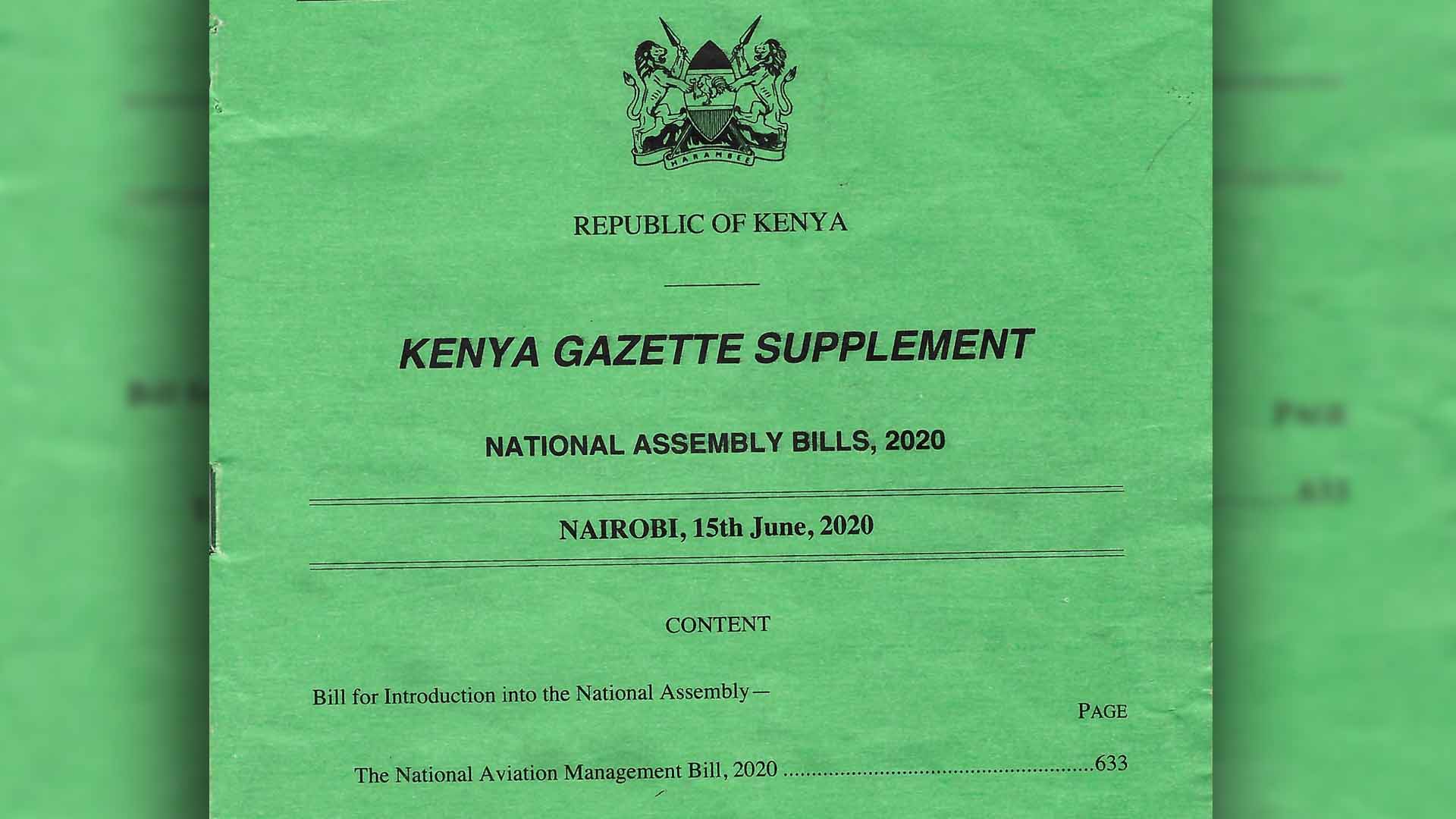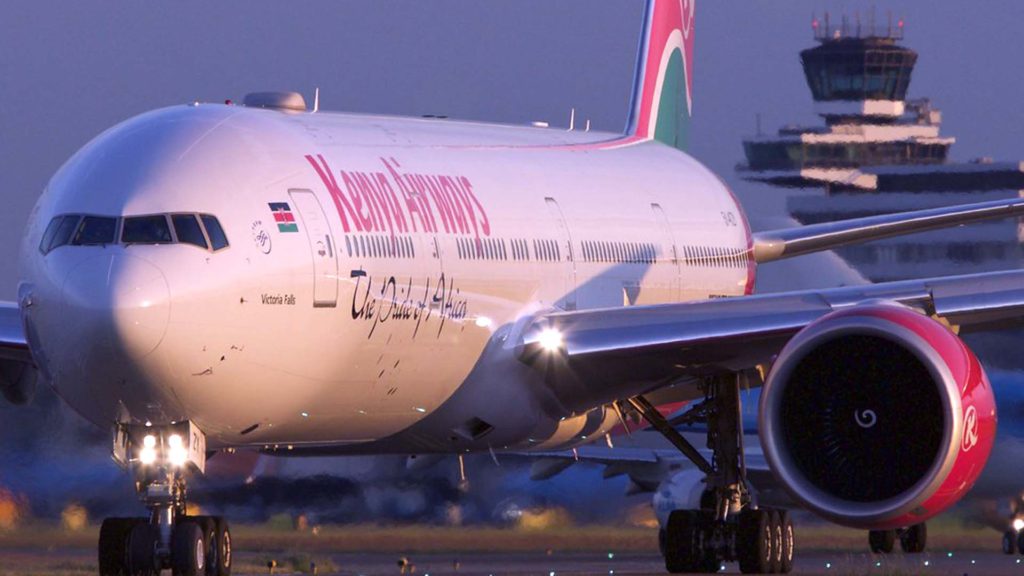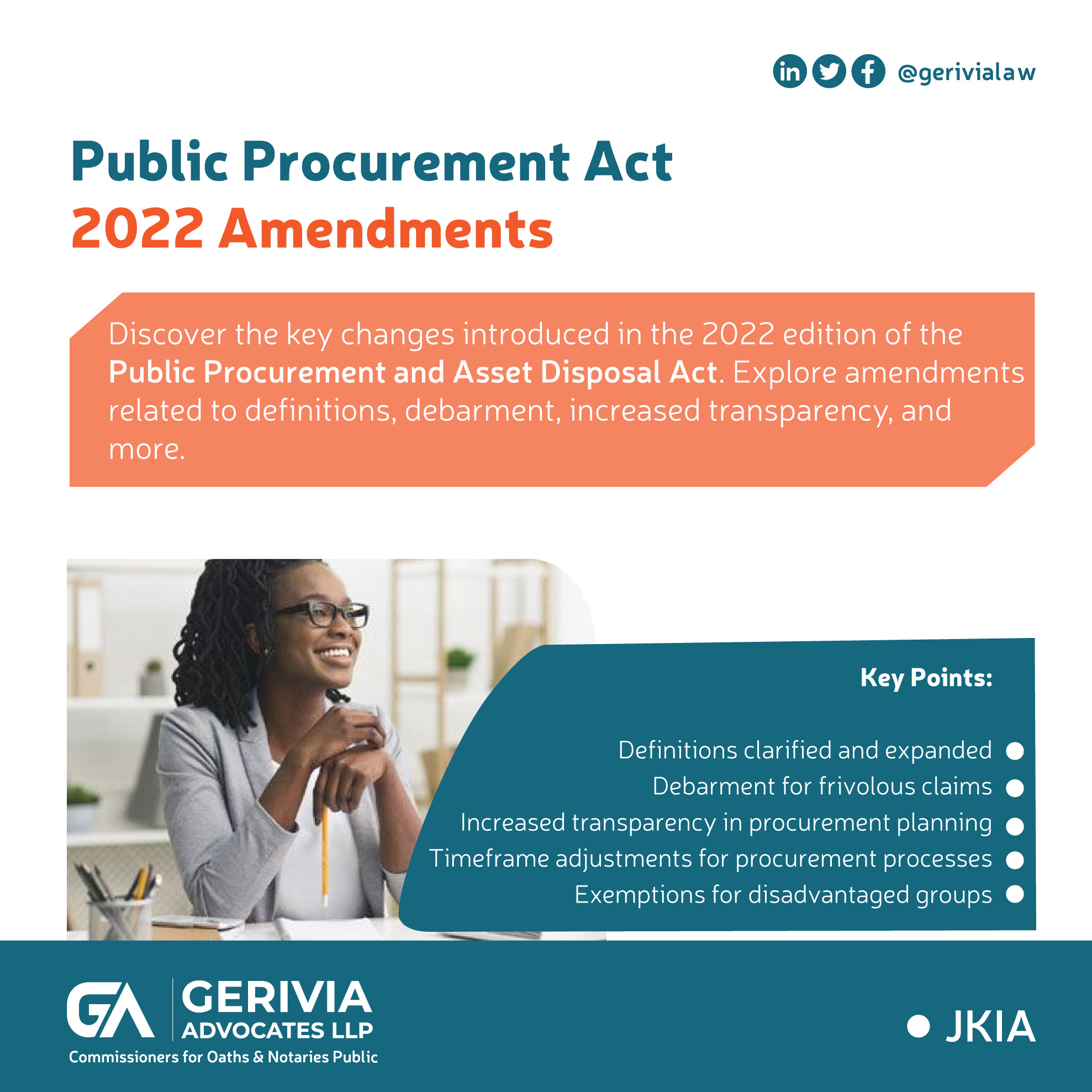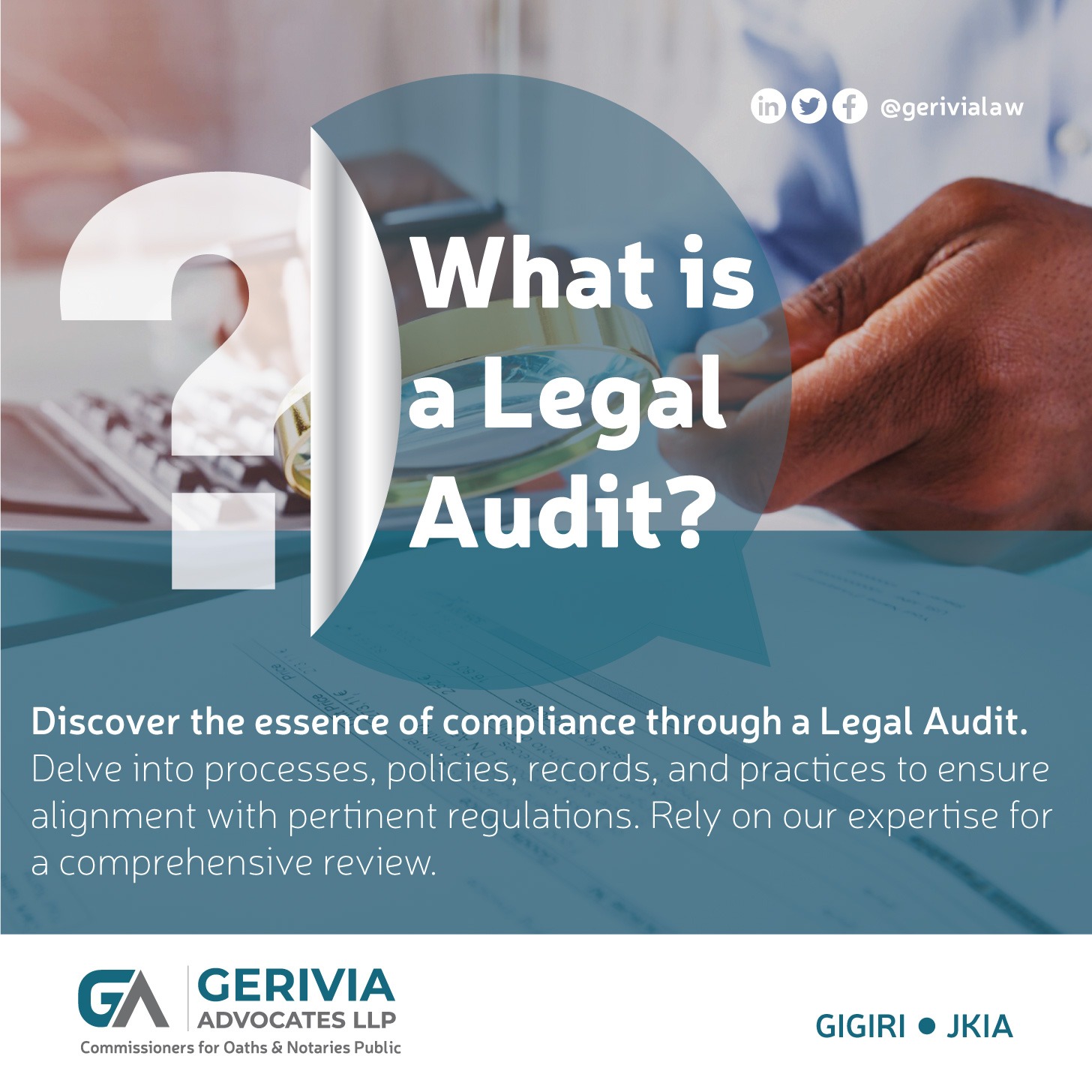Part I of this article on review of the National Aviation Management Bill, 2020 (hereinafter the Bill) focused on provisions of the Bill as contained in the clauses/sections and highlighted the main areas of concern.
The second part of this article will focus on the Schedules of the Bill which contain provisions that seek to exempt the Operating Entities (OEs) from certain laws. It will also propose some solutions while also providing practical examples to aid in a better understanding of the thinking and practicalities behind those proposals.
As stated in Part I of this article, some of the proposed solutions are not purely our own ideas but seek to echo some of the proposals made by Parliament through the Report by the Departmental Committee on Transport, Public Works and Housing dated 17th June 2019 (“the Pkosing Report”).
For a good understanding of this Part of the Article, it is recommended that you start by reading Part I of the Article which is uploaded on the Gerivia Advocates LLP Blog here.
Second Schedule of the Bill – Exemption of the Operating Entities in the Bill from the Public Procurement and Asset Disposal Act, 2015
This general amendment to Section 4 of the Public Procurement and Asset Disposal Act (PPADA), 2015 is misguided and could be abused. It is recommended that Parliament should not agree to this proposal for the following reasons:
If public money is involved, as it will be in rescuing KQ and in running the OEs and their Subsidiaries under the Bill, then there must be oversight of the procurements of these entities under the PPADA. Decisions of the Public Procurement and Administrative Review Board (PPARB) and even the Courts have made this clear.
The PPADA does not in any way hamper the operations of state entities. If the aim of the exemption is to ensure speedy procurements, there are various procurement procedures under the PPADA that can be used to facilitate this e.g. Direct Procurement (section 103) and Specially Permitted Procurement Procedures (section 114A).
The latter procedure, “Specially permitted procurement procedures”, section 114A of the PPADA is relevant to this case and is reproduced below for ease of reference.
114A. Specially permitted procurement procedure
A procuring entity may use a procurement procedure specially permitted by the National Treasury.
(2) The National Treasury may allow the use of specially permitted procedure—
(a) where exceptional requirements make it impossible, impracticable or uneconomical to comply with the Act and the Regulations;
(b) where the market conditions or behaviour do not allow the effective application of the Act and Regulations made under the Act;
(c) for specialized or particular requirements which are regulated or governed by harmonized international standards or practices;
(d) where strategic partnership sourcing is applied;
(e) where credit financing procurement is applied; or
(f) in such other circumstances as may be prescribed.
(3) The Cabinet Secretary may prescribe the procedure for carrying out specially permitted procurements under this section.
Rather than offer a blanket exemption for the entities created under the Bill from all the useful oversight provisions of the PPADA, the Cabinet Secretary should consider the application of the above provision to cater for the special needs of the entities created under the Bill.
This exemption should also be viewed in light of its effect on other sectors in the country. Allowing exemptions from the PPADA for the aviation sector generally may set a bad precedent which other sectors/ministries may attempt to follow.
Based on the explanation above, the only logical explanation behind this exemption from the PPADA is to avoid scrutiny in procurement proceedings by the PPARB and even the Courts. Lack of integrity in procurement is a problematic issue in Kenya and the country should not take the general direction of avoiding or discouraging scrutiny in this area.
The proposed amendment to the PPADA is quite broad and beyond exempting the KAC and all the OEs such as KQ and KAA and the subsidiaries, there is a risk of it being extended to other state entities under that ministry.
Already, the procurement processes for KAA as a State Parastatal are governed by the PPADA and there is no reason why they should be exempted now, or why the aviation sector generally should be exempted from the provisions of PPADA.
The nationalization of KQ is necessitated by its poor performance as noted in losses amounting to billions of shillings in recent years. It is common knowledge that there have been allegations that some of the misfortunes of KQ are not only linked to the challenging aviation environment globally but to incidences of mismanagement, poor planning and even embezzlement of funds, some which have been highlighted through the media and in various reports.
Until a forensic audit rules out the allegations of mismanagement and embezzlement, it is not clear why we should lower the oversight bar by exempting such an entity from scrutiny under the Act.
It is noted that KAA has also had its share of allegations when it comes to accountability in finances and procurement, even as noted by poor quality of works in some of its airports. It is ironical that the entities that the Bill is seeking to exempt from scrutiny are in dire need of scrutiny.
Finally, if the exemptions from the PPADA must apply, there should be safeguards such as only exempting the OEs from certain provisions of the Act or exempting them only for a certain duration of time or even for specific procurements upon application to the relevant authorities.
Another option would be for Parliament to introduce some form of safeguards such as requiring oversight of all the procurements of those OEs by the Public Procurement Regulatory Authority (PPRA). This could be in the form of notifications and/or seeking clearance from the PPRA before the procurement processes.
Amendment of Section 10 of the Companies Act
The special proposed amendments under the Bill to suit the needs of the entities thereunder should be looked into carefully by analysing their pros and cons before it is approved. Of specific concern is the provisions of Section 10L, which make it clear that other provisions of the Companies Act shall not apply to the state-owned entities.
This provision, coming after the earlier one in this Bill seeking to exempt the entities under the Bill from the provisions of the PPADA is worrying.
Why the “special treatment” to the entities under the Bill, and more in the direction of avoiding scrutiny, good governance and accountability? If other entities, private or public comply with the relevant laws, why does the Bill seek to exempt the entities from oversight?
There is no indication that the poor performance of any of the entities in the aviation sector is linked to stringent governance and accountability mechanisms or laws.
Parliament should interrogate what mischief these exemptions from certain important laws that promote good governance and accountability are meant to cure or facilitate.
Other Concerns on Applicability of Laws
Noting the tendency by the Bill to exempt the OEs from various laws and what we consider the risk of creation of amorphous entities (not private entities and not the usual state corporations), the law should be clear on the legal framework that is applicable to the entities under the Bill including:
Regulatory role of the Kenya Civil Aviation Authority
The Bill should ensure that the Regulatory role of the Kenya Civil Aviation Authority (KCAA) over the KAC and its OEs is clear. If need be, the KCAA Act should be amended to reflect the necessary changes.
Application of the Public Finance Management Act (PFMA) to the Entities under the Bill
It should be clear that the provisions of the PFMA apply to the Bill and the entities thereunder. Under the PFMA the Cabinet Secretary in charge of a state corporation is expected to comply with the requirements therein on state corporations, including monitoring their performance and reporting to cabinet as per the requirements in that Act.

Summary of other Issues to be Considered before Comprehensive Reforms
Innovation in Development and Management of Facilities
The Government should look into the possibilities of deliberate application of the Public Private Partnerships (PPP) Act to develop the infrastructure at the airport.
Reading the Pkosing Committee Report, KQ’s main complaint is lack of infrastructure at the airport including terminal buildings, runways and taxiways.
While the Government may invest in runways and taxiways, there is absolutely no reason to prevent a third party from investing in a terminal building for the exclusive use of KQ.
Simple example: Dedication of 1USD or Kshs. 100 of every ticket by KQ on annual passenger number of around 5,000,000 will yield Kshs. 500,000,000 annually and Kshs. 10b over a period of 10 years. There is no reason why KQ should not have a long-term partner with whom it can develop facilities with. The idea of targeting public funds (Air Passenger Service Charge – APSC) is somewhat lazy and non-strategic.
Similarly, KAA could adopt the same model in engaging a partner to develop the facilities and recover their monies through direct charges to airlines or dedication of part of the income to such a project.
More importantly, such arrangements will relieve these bodies of the burden of maintaining facilities, procurement procedures among others as it is the burden of the third-party investor to deliver a fully functional facility.
Review of Tendering Processes and Strategies
Still on Pkosing Report and complaints about the facilities, we note that KAA has been affected by tendering processes especially on the high capital tenders like Terminal Buildings, duty free, fire tenders among others. We propose that internal governance issues with regard to procurement be looked into.
There is a danger in excluding from PPADA a public entity which is unable to properly handle public procurement within the existing legal framework and give it a free hand. We believe these are issues that affect KAA (and state corporations) as a public entity and not a reason to interfere with its work, but rather, a call to look into the structures of such public entities.
Similarly, there is a danger in allowing KQ, which will be 100% Government owned, to operate outside Government tendering systems. If anything, we need to respect the spirit of Article 227 of the Constitution regarding public procurement.
Our Proposal for Reform – Formation of JKIA Limited
We find that in the entire structure, the reform for KAA would involve removal of JKIA from the rest of the corporation for efficiency. As correctly noted by the Pkosing report, JKIA is the main revenue earner for KAA, but the money is spread out across KAA including to cover the operating expenses of loads of loss-making airstrips.
Of significance to us however is the fact that the entity charged with the running and management of JKIA, which carries over 80% of the weight, still runs the 20% of the other operations. These other operations are spread far and wide across the country and as stated, are insignificant in terms of revenue. The absurdity of this scenario is explained using an illustration below.
Simple illustration:
The MD of KAA on a normal morning needs to address the issue of hydrant failure at JKIA leading to delay of a flight to Amsterdam at 8 am. This is being treated as an emergency by KAA, Kenya Pipeline and the concerned airline as it will complicate passenger connections at Amsterdam onwards.
At the same time, the contractor undertaking re-sealing of the runway at Lokichogio Airport left some debris on the runway, as a result, the only scheduled aircraft to that airport for the day has been forced to land in Lodwar occasioning great inconvenience on the 8 passengers on Board.
It is a bit of a stretch and perhaps misallocation of resources that the same MD/entity dealing with the Amsterdam flight has to deal with the errant contractor at the Lokichogio Airport upon escalation of the issue to his office.
We therefore propose that JKIA and its facilities as currently stands be converted into a 100% state owned entity, JKIA limited, with an MD and a Board of Directors to exclusively operate and manage JKIA. KAA can on the other hand be relocated to Wilson Airport to manage that Airport and the rest of the aerodromes in the country.
This will not only free up management of JKIA from excessive responsibilities of the non-revenue generating ventures, it will also make KAA be innovative and deliberate in raising money to develop aerodrome infrastructure for other aerodromes.
It must be appreciated that some of these aerodromes like Wilson, Eldoret, Kisumu, Moi, Nanyuki, Ukunda, Manda, Malindi, Mandera among others have huge potential for commercial activity but continue to languish in the shadow of JKIA.
We further propose that in running JKIA, the company should look for strategic partners, competitively recruited, to free itself up to run administrative issues while at the same time reaping maximum benefits out of such services.
Illustration on Strategic Partnerships:
The parking services and duty-free concession are now managed by third parties. Electronic point of sale system allows KAA to have a view of monies collected by these concessionaires and to achieve its fair share of revenue. These two services only now pay KAA in excess of Kshs. 500 million per year (all factors constant) in minimum annual guarantee, rent and concession rates. There is further a significant improvement in quality of duty-free shopping experience in T1A since concession as opposed to other terminals which pay rent only.
Similarly, there is huge improvement in parking systems including removal of delay-causing payments at the exit gates and expansion of lanes at exits. These are clear gains of good concession practices through employment of systems that allow KAA to dwell on proper administration of its core mandate while allowing functional, accountable and smooth operation of services.
KQ – Proposal of a case for Internal Reforms
We observe that the Pkosing Committee picked five issues that have led to KQ being in the dire financial situation it is finds itself in:
- Leasing of aircraft at exorbitant prices
- Poor fuel hedging strategy
- Expensive tickets
- Deployment of small aircraft in otherwise busy routes
- Limiting of baggage from 2 pieces of 23 kg to one piece thereby losing out to other airlines which allow for two pieces.
Respectfully, we find the above to be issues that call for internal reform of the airline and not a case for nationalization.
We hold the view that the Government, even if it intends to nationalize, should look into why KQ continues to make such obvious missteps that make it less competitive as opposed to employing drastic measures while addressing the root causes of the issues.
KQ could start reforming itself through adopting better policies through careful, sincere, honest and strategic thought processes to see exactly where the rot comes in. The proposed targeting of APSC will only lead to more loss of public funds through payment of private debt by the public.
The loss of public funds risks being even higher noting that the Bill seeks to exempt KQ (and the entities under KAC) from some of the laws that would make it accountable. We plead with Parliament not to allow this to happen.
Long term reform of KQ will lead to long term solutions. Reduction and streamlining of its size in terms of route structure, staffing size, running costs among others will bring long term benefits to the airline as opposed to random injection of public finances.
Conclusion
Parliament should be generally careful about provisions of the Bill that seek to exempt the state entities created under the Bill from certain provisions of the law, including the provisions seeking to exempt the entities from the provisions of certain laws.
Of concern is that the amendments to the various laws i.e. PPADA and Companies Act, which are introduced under the Bill, will also be applicable to other entities in the future. The amendments are not just restricted to the entities under this Bill.
With such broad exemptions, the country risks ending up with entities that are barely regulated or oversighted due to their amorphous nature i.e. neither government/the standard state corporations nor private and hence not governed by the laws related to government entities or the laws related to private entities.
It is clear that the Bill in its current form falls short in many respects and will require amendments, including increasing provisions for accountability and scrutiny to ensure better utilization of the state resources invested in KQ and the aviation sector and a return to profitability of our ailing national carrier.
Whichever exemptions that Parliament eventually agrees on (if there must be exemptions), there must be sufficient scrutiny of all the entities created under the Bill, keeping in mind that granting exemptions from laws to some entities in one sector might create a bad precedent for other entities and ministries.
Written by George Karuthui Kamau, Susan Wairimu Munene & Sylvia Wambui Waiganjo




